What are stereotypes?
“Stereotypes are non-scientific over-generalizations about a social group. Stereotypes can be positive or negative, conscious and unconscious inferences about a social group.” (Learn & Unlearn: Anti-racism Resource Guide)
Reinforcing negative stereotypes at a wedding looks like:
- A white couple hosting a “Mexican Wedding” with guests wearing ponchos, and sombreros.
“Stereotypes are a bit like air: invisible but always present.” - Magdelena Zawisza
What’s wrong with the term ‘Bride Tribe’?
For starters, Tribe a racially sensitive word co-opted by white people. African and North American Indigenous cultures agree that the term “tribe” promotes misleading stereotypes while carrying generations of cultural assumptions and targeted discrimination.
Alternative terms to refer to your group of friends on your wedding day:
Wedding Crew
Wedding Party - Assemble!
The Order of the Wedding Party
The Fellowship
Bridal Bunch
Groom Guild
Order of the ____ (insert new last name)
Wedding Squad
Why can’t we use the term “Spirit Animals”?
Spirit Animal is one of the most culturally appropriated phrases. It’s offensive and it’s not ours to have. While it seems harmless to you, spirit animals are highly important aspects to Indigenous Culture.
“While the concept is the same, most tribes don’t even refer to them as spirit animals anyway, but rather as guides, totems, messengers, or even gods. Several gods are personified animals. Using the phrase “spirit animal” is an overgeneralization of deeply personal traditions.” - Say This, Not That: A Traveler’s Guide to Mindful Language
“The concept originated in indigenous cultures, sometimes in the form of totems, which are sacred objects, spiritual beings, or symbols that represent a specific group of people (typically a family, lineage, or tribe).”
Alternative terms to use:
Alter Ego
Soulmate
Idol
Kindred Spirit
Muse
Patronus
Soul Sibling
Twin
Desired Doppleganger
Familiar
What is considered offensive language to other cultures that aren’t my own?
Some of these terms might be the first time you’re learning their biases and implications - which is exactly why we’re doing this. Once you learn this and intentionally make the choice to not use them, you might notice how often these terms are used. It’s not okay.
From Say This, Not That: A Traveler’s Guide to Mindful Language by Ashley Hubbard
Gypped, Gypsy, Gyp - Using the terms gypsy, gypped or gyp perpetuates negative and unfair stereotypes, and is disrespectful to the Romani community and their history.
Alternative terms to use: ripped off, cheated, conned, bamboozled, swindled
Powwow - Powwows are an inter-tribal social gathering that includes dance, singing, and ceremonial elements.
Alternative terms to describe a meeting, gathering, chat, brainstorming session: Meeting of the minds, chat, brainstorm
Guru - A term from Buddhist and Hindu religions to refer to a spiritual guide or leader who is held in high esteem.
Alternative terms to describe how you’re wicked good at something: aficionado, expert, virtuoso, authority
No Can Do - The phrase ‘no can do’ dates from the mid-19th to early-20th centuries when Western attitudes toward the Chinese were markedly racist. The phrase is mocking broken English, essentially.
Alternative phrase: I Can’t Do That
Nomad / Digital Nomad - There are nomadic people and cultures that have much deeper histories than a “digital nomad” do, and by overusing this term, especially out of context, you make over-generalizations that don’t take deeper meanings, cultures or history into account. Are you really nomadic or do you just move a lot?
Alternative terms: remote worker, location independant worker
Sherpa - Sherpa is a legit ethnic group, and a particularly impressive one at that – they are Himalayan people living on the borders of Nepal and Tibet, renowned for their skill in mountaineering. Some may think that Sherpa is another word for guide, but it’s not. A Sherpa is a guide, but not all guides can be Sherpas.
Alternative terms to use in a metaphorical sense: Leader, Guide, Coach,
What Fashion, Rituals, Decor, Hairstyles, Entertainment and Traditions
could be appropriative on a wedding day?
If you do not belong to the culture, if you are not marrying into the culture and invited to respectfully join in and share in the traditions, then do not do them.
Reminder: This blog post is generally speaking to an Anglo-American audience.
Fashion to avoid: traditional wedding attire of any other culture, mehndi/henna, Hawaiian leis, kimonos, rosaries, headdress, bindis, Aztec patterns
Entertainment to avoid: Bellydancers, mariachi band, animals to reinforce a stereotype, animals dressed up from a specific culture, DJs who don’t scratch out the N word from songs at white weddings
Rituals to avoid: any ritual of any culture you are not a part of.
Traditions to avoid: any tradition of any culture you are not a part of, smashing glasses, bringing alcohol to a culturally dry wedding,
Decor to avoid: any harmful stereotype to a culture you are not a part of, cotton in bouquets, paper cranes, African masks, papel picado (punched paper traditionally found in Latin wedding decor), teepee,
Hairstyles to avoid: Bantu knots, Fulani braids, Ghana braids (or cornrows / box braids), Locs
These are all awesome, but they are not yours.
“From the moment black people were forcibly brought to North America and the Caribbean, our hair has been politicized. There was even a time when we legally had to cover our hair. With the growing number of anti-hair discrimination bills that are being passed throughout the country, the issue isn’t that you’re wearing our hairstyles.”
- Alysia Stevenson
Before you include it in your wedding day, ask yourself:
Is it something that people have been discriminated against or shamed for?
Does it hold sacred and ceremonial meaning?
Who would I be hurting?
Do I need it to have a joyful wedding day?
If you have uncertain feelings about your answers to these, there is a good chance you should probably leave it out of your wedding day. Better to be safe then accidentally offensive and inappropriate.
When in doubt, don’t do it!
What are sacred / insensitive spaces that should NOT be used as a venue?
- Any place of worship to a religion you or your partner do not belong to.
- Plantations. This is also why white people using cotton as decor feels icky.
- Destination Weddings are tricky. Using local vendors is suggested to put money directly into the hands of the people who live there year round. It will go back into their economy.
“A plantation is an economic system, a business, in which its profitability is linked to the forced labor of enslaved people,” says Dr. Joy Banner.
“Plantations are the sites of violence and brutality; an enslaved labor camp with a pretty house on it.”
To watch:
Resources
- Greenheart International: https://greenheart.org/blog/greenheart-international/cultural-appreciation-vs-cultural-appropriation-why-it-matters
- Healthline: https://www.healthline.com/health/cultural-appreciation
- Aisle Planner: https://www.aisleplanner.com/blog/art-events/cultural-appropriation-wedding-themes-decor
- Layla Saad: Author of Me and White Supremacy (2020), Website: http://laylafsaad.com/
- Festival Brides (UK): https://www.festivalbrides.co.uk/cultural-appropriation-vs-appreciation-in-the-wedding-industry/
- Nova Reid: nubride.com + novareid.com
- Learn and Unlearn: Anti-Racism Resource Guide: https://libraryguides.saic.edu/learn_unlearn/foundations9
- The Terrifying Power of Stereotypes - and How to Deal with Them by Magdelena Zawisza: https://theconversation.com/the-terrifying-power-of-stereotypes-and-how-to-deal-with-them-101904
- Why You Might Want to Reconsider Using ‘Tribe’ In Your Business Community by Eli Trier: https://elitriercommunities.com/blog/reconsider-tribe-business-community
- The Trouble with Tribe, by Chris Lowe: https://www.learningforjustice.org/magazine/spring-2001/the-trouble-with-tribe
- Why is Spirit Animal Offensive by Allison Cacich: https://www.distractify.com/p/why-is-spirit-animal-offensive
- Say This, Not That: A Traveler’s Guide to Mindful Language by Ashley Hubbard: https://www.impacttravelalliance.org/travelers-guide-to-mindful-language/
- Which Hairstyles Are Cultural Appropriation? Here’s Everything You Need To Know by Alysia Stevenson: https://www.femestella.com/which-hairstyles-are-cultural-appropriation-braids-buns/
- What is Cultural Appropriation and How Can You Avoid It? by Najva Sol: https://apracticalwedding.com/what-is-cultural-appropriation-definition-examples/
- It Was Never Ok To Get Married At A Plantation, Here’s Why by Olivia Hosken: https://www.townandcountrymag.com/the-scene/weddings/a33446093/plantation-wedding-controversy-ryan-reynolds-blake-lively/
“Change means growth, and growth can be painful. But we sharpen self-definition by exposing the self in work and struggle together with those whom we define as different from ourselves, although sharing the same goals.”










































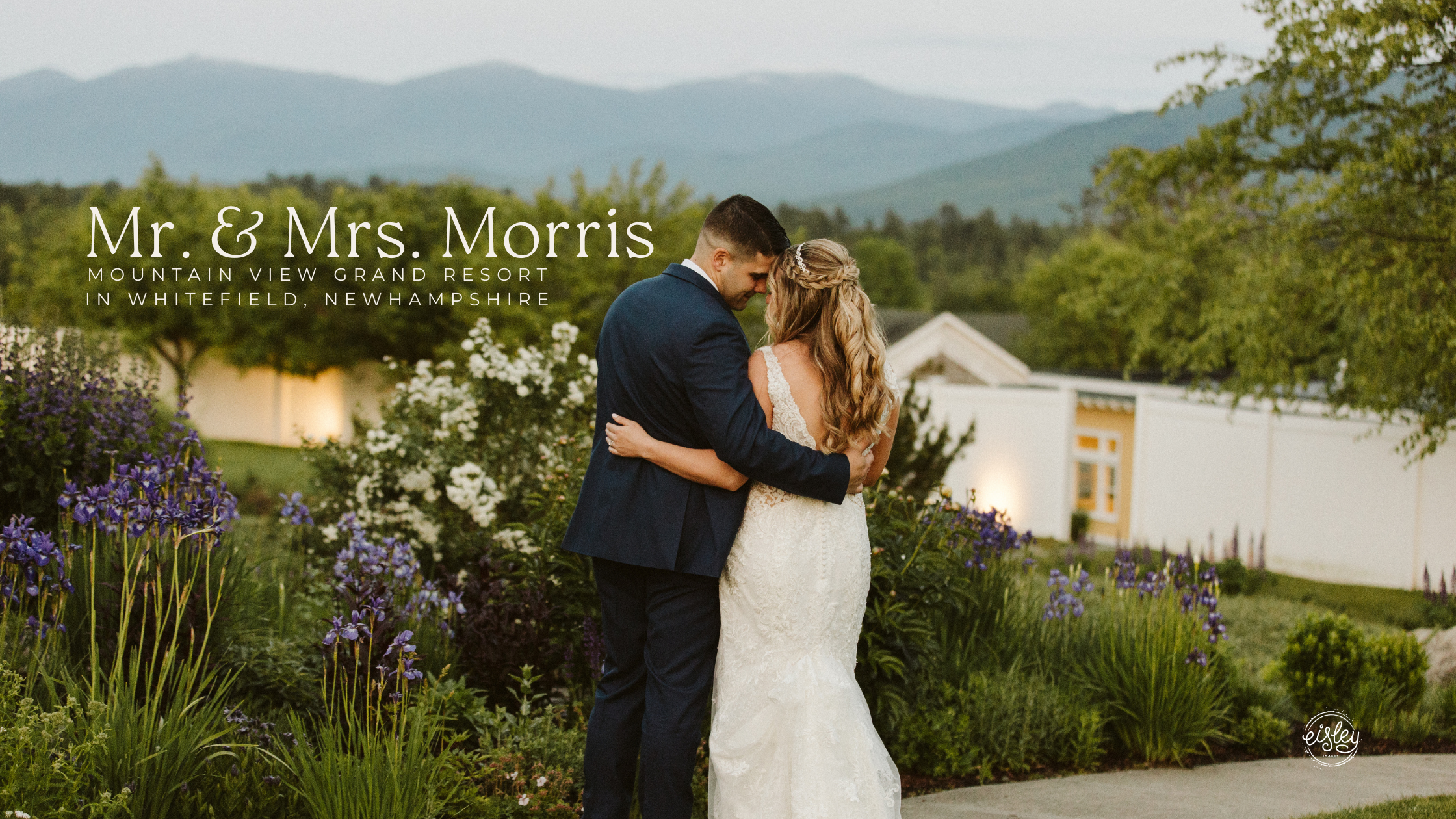














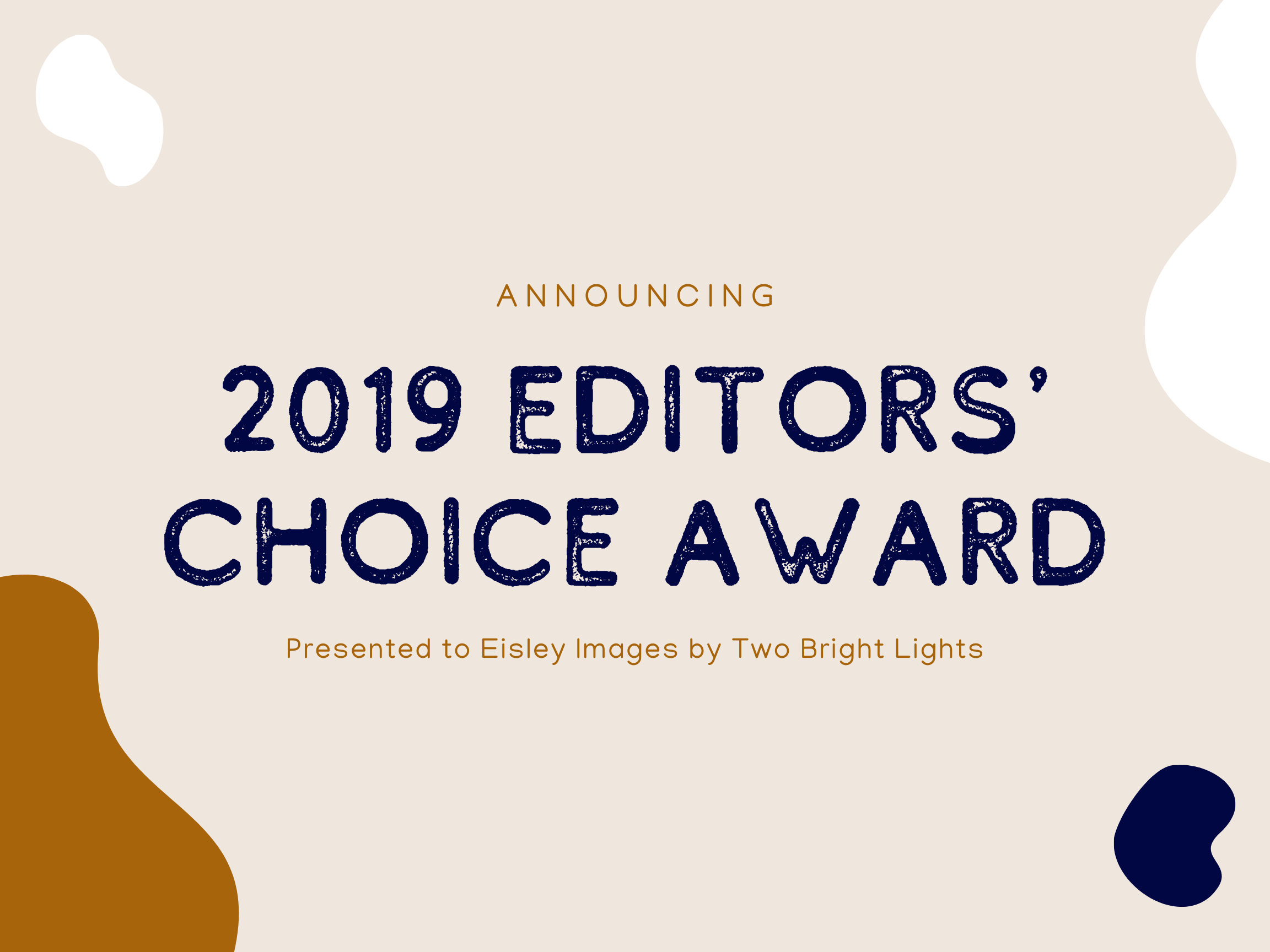


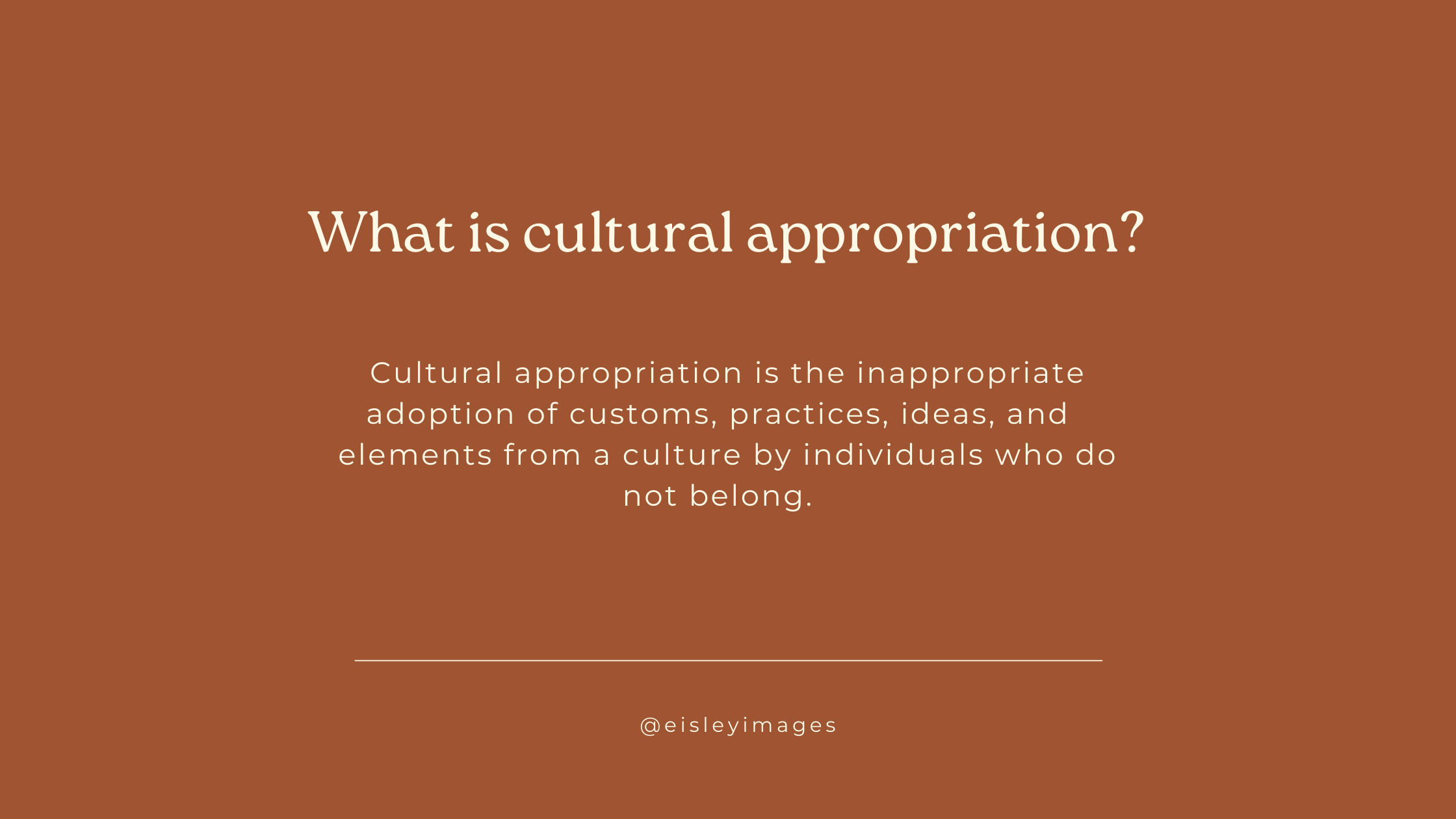
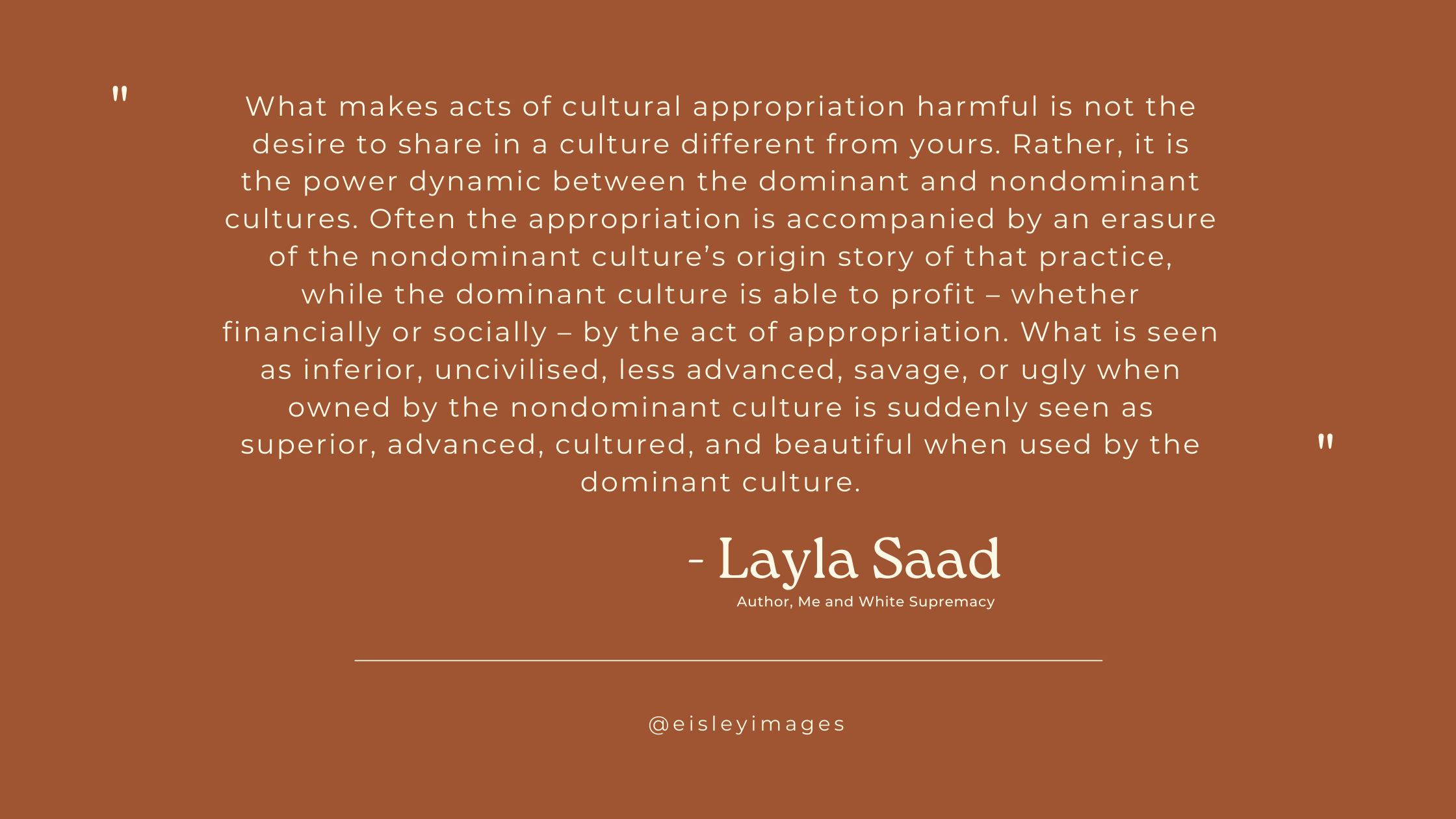
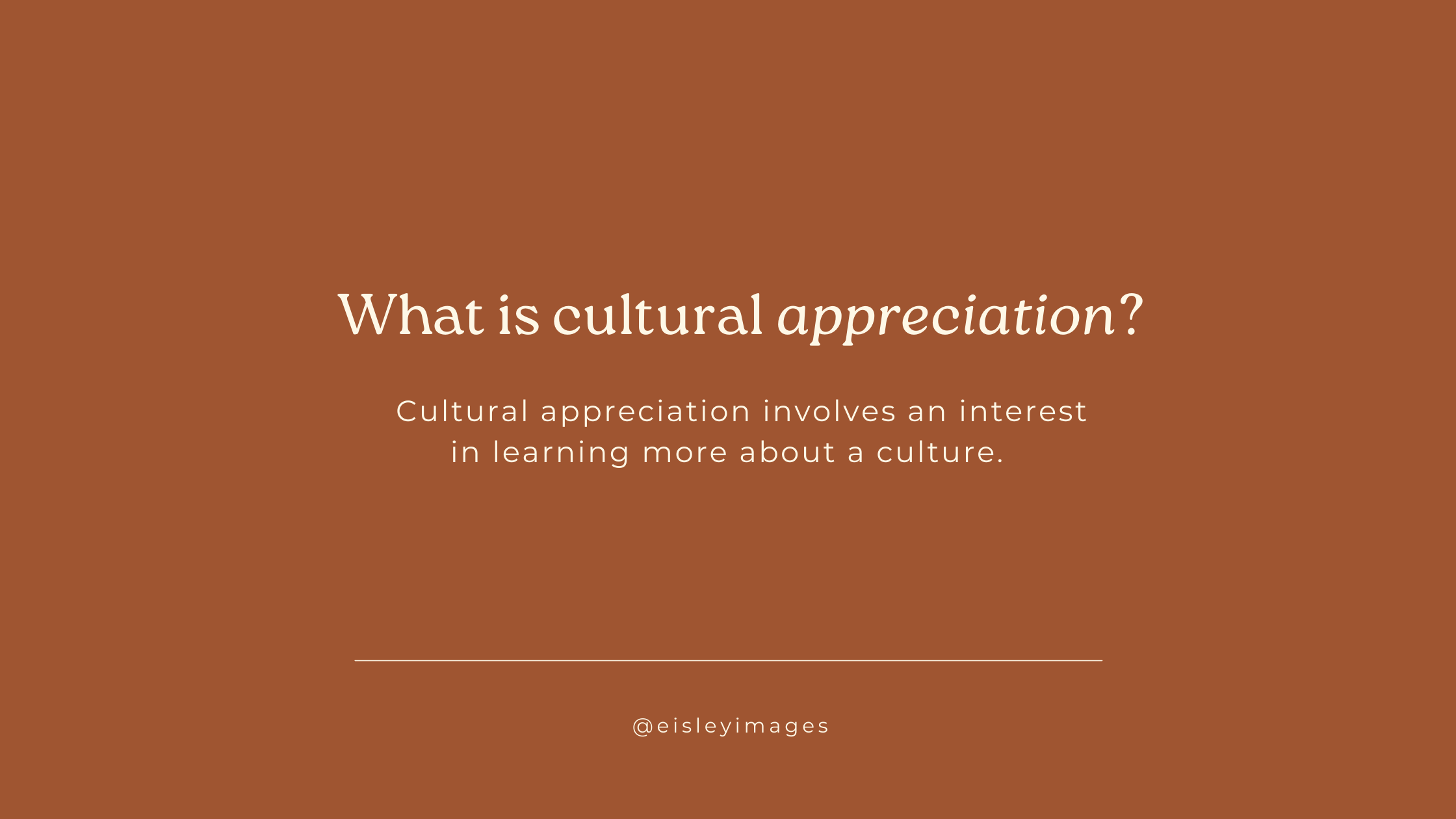


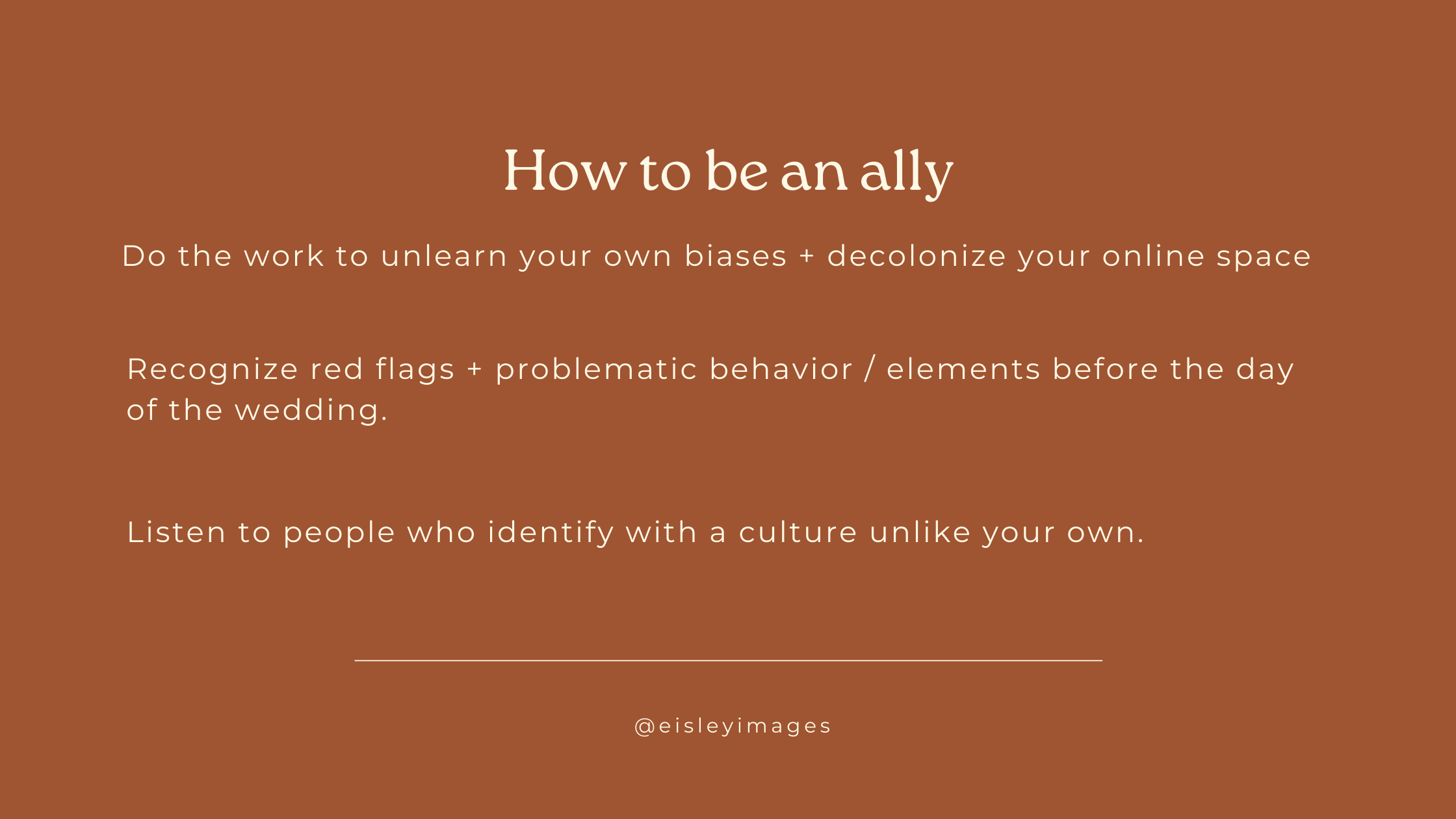

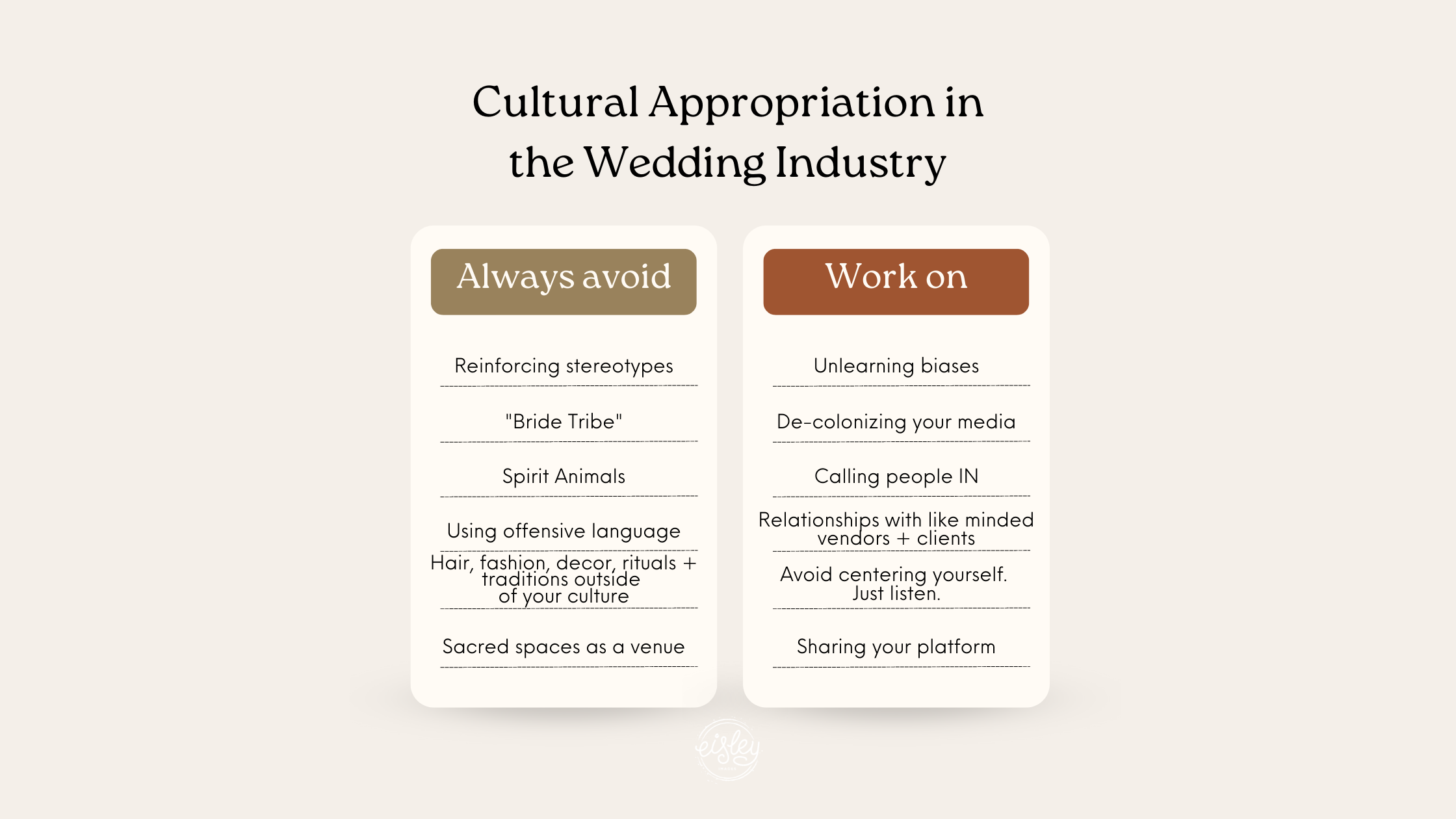
Raise your hand if your family photo has ever been sabotaged by your child using only their weird fake smile 🙋♀️ You know the one.
One thing I hear time and time again from fellow parents (of babies, and of grown ones too) is they wish someone could snap their photo during the moments that feel the most real. The moments where the magic of all your people in one place together brings out the most authentic versions of yourselves. There’s a certain energy that comes out of each of us when we’re some place we want to be, with people we actually want to be with, while feeling beautiful in your own way.